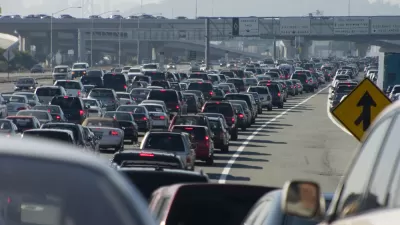A week before a Nov. 3 Maine transportation referendum on a *general fund bond issue to address roads and bridges, TRIP released a report showing that over a third of the state's bridges "are structurally deficient or functionally obsolete."
[Updated 11/2/15] "On Nov. 3, Mainers will vote on three statewide referendum questions," writes state Representative Andrew J. McLean (D-Gorham), chairman of the Transportation Committee, in an opinion for Kennebec Journal on Central Maine.com to support Question 3.
From Maine.gov: November 3, 2015 - Referendum Election:
Question 3: Bond Issue
Do you favor an $85,000,000 bond issue for construction, reconstruction and rehabilitation of highways and bridges and for facilities and equipment related to ports, harbors, marine transportation, freight and passenger railroads, aviation, transit and bicycle and pedestrian trails, to be used to match an estimated $121,500,000 in federal and other funds?
Eighty percent, or "$68 million of these funds will be used to construct and repair state highways, repair secondary roads in partnership with local communities and replace or rehabilitate bridges," writes McLean. "The remaining $17 million would be dedicated to a variety of other projects with the priority of identifying and targeting those that most improve public safety and support economic growth."
"The TRIP report, 'Preserving Maine’s Bridges: The Condition and Funding Needs of Maine’s Bridge System' (pdf), finds that 15 percent of Maine’s state and locally maintained bridges are structurally deficient, which means there is significant deterioration of the bridge supports or other major components," states the Washington, DC based national transportation organization's press release. The acronym previously stood for The Road Information Project.
"Lawmakers voted overwhelmingly in favor of issuing the $85 million in bonds for these transportation needs before sending the proposal to Maine voters for final approval, as required by the Maine Constitution," notes Rep. McLean.
There should be little question as to whether the funds are necessary. McLean compares Maine to New Hampshire, a state with comparable population (1.327 million) but half the number of roads and bridges.
However, after consider effort, New Hampshire increased its gas tax by 4.2-cents per gallon to 24 cents last year. Maine's 30-cent gas tax hasn't changed since 1993, according to an informative article from MPBN, Maine's NPR News Source.
Voters backed a $100 million bond measure two years ago.
Regrettably, McLean doesn't mention that bond measures are not a sustainable strategy to address transportation funding. User fees, such as gas taxes or tolls, are not mentioned. Interestingly, he took the same approach last year in an opinion piece posted here.
Hat tip to AASHTO Journal.
*The post was updated to reflect the referendum's approval of a general fund bond issue, rather than a property tax.
FULL STORY: Funding for safer roads, stronger economy goes to voters Nov. 3

Alabama: Trump Terminates Settlements for Black Communities Harmed By Raw Sewage
Trump deemed the landmark civil rights agreement “illegal DEI and environmental justice policy.”

Study: Maui’s Plan to Convert Vacation Rentals to Long-Term Housing Could Cause Nearly $1 Billion Economic Loss
The plan would reduce visitor accommodation by 25% resulting in 1,900 jobs lost.

Why Should We Subsidize Public Transportation?
Many public transit agencies face financial stress due to rising costs, declining fare revenue, and declining subsidies. Transit advocates must provide a strong business case for increasing public transit funding.

Paris Bike Boom Leads to Steep Drop in Air Pollution
The French city’s air quality has improved dramatically in the past 20 years, coinciding with a growth in cycling.

Why Housing Costs More to Build in California Than in Texas
Hard costs like labor and materials combined with ‘soft’ costs such as permitting make building in the San Francisco Bay Area almost three times as costly as in Texas cities.

San Diego County Sees a Rise in Urban Coyotes
San Diego County experiences a rise in urban coyotes, as sightings become prevalent throughout its urban neighbourhoods and surrounding areas.
Urban Design for Planners 1: Software Tools
This six-course series explores essential urban design concepts using open source software and equips planners with the tools they need to participate fully in the urban design process.
Planning for Universal Design
Learn the tools for implementing Universal Design in planning regulations.
Smith Gee Studio
Alamo Area Metropolitan Planning Organization
City of Santa Clarita
Institute for Housing and Urban Development Studies (IHS)
City of Grandview
Harvard GSD Executive Education
Toledo-Lucas County Plan Commissions
Salt Lake City
NYU Wagner Graduate School of Public Service



























